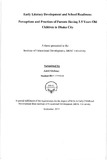Early literacy development and school readiness: perceptions and practices of parents having 3-5 years old children in Dhaka city
Abstract
Research on early literacy in Bangladesh is mostly concentrated on poorly resourced
environments and early literacy practices done by illiterate parents of lower socio-economic
communities in rural areas. This study aimed to explore educated parents' perceptions and
practices towards early literacy related skills in urban context at home settings. Additionally, it
examined the home literacy interventions of 3-5 years old children and their pre-literacy skills in
relation to school readiness. Data in this study collected through home observations and in-depth
interviews with five mothers and conducted in natural home settings. The questionnaire was pretested
and translated pdor to the actual study. This study is followed by three main research questions such as, parental perceptions
towards early literacy and school readiness, availability of literacy materials and the process of
doing literacy activities at home. Qualitative approach and purposive sample technique were
employed in doing the study. Study reveals that educated parents prefer doing informal and unstructured early literacy
promotional activities at home settings. They moderately mediate and facilitate early literacy
promotional activities along with moderate facilitation of available resources at homes. Parents
view home is the main repository for acquiring literacy skills but there lies lack of understanding
towards the contributing factors that makes positive home literacy environment. Early reading is
viewed as only beneficial for children's academic success and the benefits of early reading
associated with other domains (social, emotional, psychosocial etc) are mostly overlooked in
parents' responses. Parents are unable to model the behavior of story books reading to their
children due to their own literacy habits and knowledge gap, and it works as a reason of
conducting less story book reading sessions at home settings. Data suggests that parents seem to
be unaware of the fact that shared reading can be a contributing factor to early literacy.
Additionally, study reveals that social behavior of schools mostly determines what preJiteracy
skills these age group children bring to schools as part of their school readiness. Child's own
ability in academic skills is viewed as his/her'school readiness' and readiness in other domains
along with family's readiness is overlooked in parent's responses. The study highlighted that educated parents have the understanding that their roles and
contribution are factors for promoting children's early literacy but they have inadequate
understanding and knowledge gap regarding the significance of their involvement in child's
literate life. That's' why parents moderately scaffold and facilitate early literacy promotional
activities and available resources at homes despite having opportturities. If parents were more
conscious about the significance of their engagement in children's literate life, they might view
'family readiness' essential for child's 'school readiness.'

